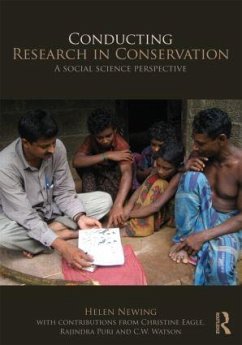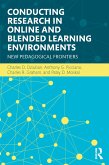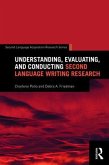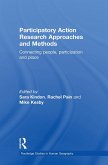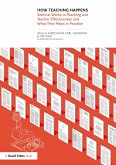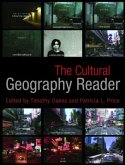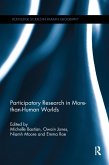Helen Newing (UK University of Kent)
Conducting Research in Conservation
Social Science Methods and Practice
Helen Newing (UK University of Kent)
Conducting Research in Conservation
Social Science Methods and Practice
- Broschiertes Buch
- Merkliste
- Auf die Merkliste
- Bewerten Bewerten
- Teilen
- Produkt teilen
- Produkterinnerung
- Produkterinnerung
Focuses on social science research methods. This title contains a section on planning a research project that includes chapters on the need for social science research in conservation, defining a research topic, methodology, and sampling. It also focuses on practical issues in carrying out fieldwork with local communities.
Andere Kunden interessierten sich auch für
![Conducting Research in Online and Blended Learning Environments Conducting Research in Online and Blended Learning Environments]() Charles D. DziubanConducting Research in Online and Blended Learning Environments46,99 €
Charles D. DziubanConducting Research in Online and Blended Learning Environments46,99 €![Understanding, Evaluating, and Conducting Second Language Writing Research Understanding, Evaluating, and Conducting Second Language Writing Research]() Charlene Polio (USA Michigan State University)Understanding, Evaluating, and Conducting Second Language Writing Research74,99 €
Charlene Polio (USA Michigan State University)Understanding, Evaluating, and Conducting Second Language Writing Research74,99 €![Participatory Action Research Approaches and Methods Participatory Action Research Approaches and Methods]() Participatory Action Research Approaches and Methods68,99 €
Participatory Action Research Approaches and Methods68,99 €![How Teaching Happens How Teaching Happens]() Paul KirschnerHow Teaching Happens21,99 €
Paul KirschnerHow Teaching Happens21,99 €![The Cultural Geography Reader The Cultural Geography Reader]() Timothy Oakes / Patricia L. Price (eds.)The Cultural Geography Reader104,99 €
Timothy Oakes / Patricia L. Price (eds.)The Cultural Geography Reader104,99 €![A to Z Practical Guide to Emotional and Behavioural Difficulties A to Z Practical Guide to Emotional and Behavioural Difficulties]() Harry AyersA to Z Practical Guide to Emotional and Behavioural Difficulties175,99 €
Harry AyersA to Z Practical Guide to Emotional and Behavioural Difficulties175,99 €![Participatory Research in More-than-Human Worlds Participatory Research in More-than-Human Worlds]() Participatory Research in More-than-Human Worlds73,99 €
Participatory Research in More-than-Human Worlds73,99 €-
-
-
Focuses on social science research methods. This title contains a section on planning a research project that includes chapters on the need for social science research in conservation, defining a research topic, methodology, and sampling. It also focuses on practical issues in carrying out fieldwork with local communities.
Hinweis: Dieser Artikel kann nur an eine deutsche Lieferadresse ausgeliefert werden.
Hinweis: Dieser Artikel kann nur an eine deutsche Lieferadresse ausgeliefert werden.
Produktdetails
- Produktdetails
- Verlag: Taylor & Francis Ltd
- Seitenzahl: 400
- Erscheinungstermin: 13. Oktober 2010
- Englisch
- Abmessung: 244mm x 170mm x 21mm
- Gewicht: 702g
- ISBN-13: 9780415457927
- ISBN-10: 0415457920
- Artikelnr.: 29337464
- Herstellerkennzeichnung
- Libri GmbH
- Europaallee 1
- 36244 Bad Hersfeld
- gpsr@libri.de
- Verlag: Taylor & Francis Ltd
- Seitenzahl: 400
- Erscheinungstermin: 13. Oktober 2010
- Englisch
- Abmessung: 244mm x 170mm x 21mm
- Gewicht: 702g
- ISBN-13: 9780415457927
- ISBN-10: 0415457920
- Artikelnr.: 29337464
- Herstellerkennzeichnung
- Libri GmbH
- Europaallee 1
- 36244 Bad Hersfeld
- gpsr@libri.de
Helen Newing has a first degree from Reading University in Zoology and Psychology and an interdisciplinary PhD from the Psychology and Biological Sciences departments at Stirling University. She has carried out extensive fieldwork in Peru and West Africa both for the NGO sector and as an academic researcher, and has contributed to research and implementation projects in some 26 countries. Current research interests include protected areas governance, traditional knowledge and indigenous rights. Since 1999 she has worked as a lecturer at the Durrell Institute of Conservation and Ecology (DICE) in the School of Anthropology and Conservation at the University of Kent, where she has developed teaching materials on social science methods and interdisciplinarity for conservation students. Christine Eagle has an MSc in Social Statistics and has been teaching research design and statistical analysis to conservation and anthropology students since the late 1990s at the University of Kent. She has participated in the design of research projects involving fieldwork both in the UK and in developing countries. She is passionately committed to improving students' numerical and statistical understanding, and promoting a mixed-methods approach to social science research that encompasses both quantitative and qualitative empirical methodologies. Rajindra Puri is a Senior Lecturer in Environmental Anthropology and Ethnobiology at the University of Kent. He received his PhD in Anthropology from the University of Hawai'i in 1997 and has worked at the East-West Center in Honolulu and the Center for International Forestry Research (CIFOR) in Bogor, Indonesia. He co-authored CIFOR's Multidisciplinary Landscape Assessment (MLA) methodology, which integrates classic biodiversity assessment with ethnobotanical tools and anthropological methods to document local people's priorities, values and knowledge of natural resources.This project produced a methods manual currently being used in several countries across the world. He is the author of Deadly Dances in the Bornean Rainforest, Hunting knowledge of the Penan Benalui (KITLV 2005), and the Bulungan Ethnobiology Handbook (CIFOR 2001), a regional study of plants and animals in Indonesian Borneo. His current research explores climate anthropology in Borneo and Europe. C W (Bill) Watson is Emeritus Professor of Social Anthropology and Multi-Cultural Studies at the University of Kent and a past member of the Council of the Royal Anthropological Institute. His research has focused on issues including multiculturalism, the practice and politics of Islam in Indosesia, perceptions of gender, local village politics and textual criticism. He has over twenty years' field experience, including field supervision of doctoral students, and has also worked as a consultant to industry. He has taught research ethics to anthropology postgraduates for ten years.
Section 1: Planning a Research Project 1. Introduction: Social Science
Research in Conservation 2. Defining the Research Topic 3. Developing the
Research Design 4. Sampling Section 2: Methods 5. Participant Observation
6. Qualitative Interviews and Focus Groups 7. Questionnaires 8. Documenting
Local Environmental Knowledge and Change 9. Community Workshops and the PRA
Toolbox 10. Participatory Mapping Section 3: Fieldwork with Local
Communities 11. Preparing for Fieldwork and Collecting and Managing Data in
the Field 12. The Role of the Researcher 13. The Ethical Issues in Research
Section 4: Data Processing and Analysis 14. Processing and Analysis of
Qualitative Data 15. Quantitative Analysis: Descriptive Statistics 16.
Quantitative Analysis: Inferential Statistics Section 5: Writing up the
Report 17. Writing up the Report 18. Final Dissemination and Follow-up
Research in Conservation 2. Defining the Research Topic 3. Developing the
Research Design 4. Sampling Section 2: Methods 5. Participant Observation
6. Qualitative Interviews and Focus Groups 7. Questionnaires 8. Documenting
Local Environmental Knowledge and Change 9. Community Workshops and the PRA
Toolbox 10. Participatory Mapping Section 3: Fieldwork with Local
Communities 11. Preparing for Fieldwork and Collecting and Managing Data in
the Field 12. The Role of the Researcher 13. The Ethical Issues in Research
Section 4: Data Processing and Analysis 14. Processing and Analysis of
Qualitative Data 15. Quantitative Analysis: Descriptive Statistics 16.
Quantitative Analysis: Inferential Statistics Section 5: Writing up the
Report 17. Writing up the Report 18. Final Dissemination and Follow-up
Section 1: Planning a Research Project 1. Introduction: Social Science
Research in Conservation 2. Defining the Research Topic 3. Developing the
Research Design 4. Sampling Section 2: Methods 5. Participant Observation
6. Qualitative Interviews and Focus Groups 7. Questionnaires 8. Documenting
Local Environmental Knowledge and Change 9. Community Workshops and the PRA
Toolbox 10. Participatory Mapping Section 3: Fieldwork with Local
Communities 11. Preparing for Fieldwork and Collecting and Managing Data in
the Field 12. The Role of the Researcher 13. The Ethical Issues in Research
Section 4: Data Processing and Analysis 14. Processing and Analysis of
Qualitative Data 15. Quantitative Analysis: Descriptive Statistics 16.
Quantitative Analysis: Inferential Statistics Section 5: Writing up the
Report 17. Writing up the Report 18. Final Dissemination and Follow-up
Research in Conservation 2. Defining the Research Topic 3. Developing the
Research Design 4. Sampling Section 2: Methods 5. Participant Observation
6. Qualitative Interviews and Focus Groups 7. Questionnaires 8. Documenting
Local Environmental Knowledge and Change 9. Community Workshops and the PRA
Toolbox 10. Participatory Mapping Section 3: Fieldwork with Local
Communities 11. Preparing for Fieldwork and Collecting and Managing Data in
the Field 12. The Role of the Researcher 13. The Ethical Issues in Research
Section 4: Data Processing and Analysis 14. Processing and Analysis of
Qualitative Data 15. Quantitative Analysis: Descriptive Statistics 16.
Quantitative Analysis: Inferential Statistics Section 5: Writing up the
Report 17. Writing up the Report 18. Final Dissemination and Follow-up

